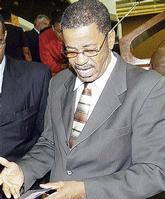Camilo Thame, Business Reporter

Hugh Cross, managing director of Universal Access Fund Company Limited. - File
International telephone carriers delinquent in paying over the Universal Access levy to the fund company from as far back as July, appear to have avoided the axe placed above their heads by the Office of Utilities Regulation (OUR) to finalise payment arrangements by Wednesday.
The companies were given to December 31 to clear all arrears.
But sector players are blaming the sluggishness of the authorities to address competition through other telecommunications media not subject to the cess, such as Voice over Internet Protocol (VoIP), which some small telecoms cite as reason for not paying the levy while others exited the market altogether.
The telecoms regulator ruled however that the bypass issue was separate and could not be used as an excuse not to pay the levy, which was instituted in April 2005 by ministerial order under the Telecommunications Act, according to a statement from the Universal Access Fund Company Limited (UAF).
"The OUR has, by letters dated November 15, 2006 to the relevant parties, directed that the issue of avoidance of levy through bypass services is a separate matter and will be investigated accordingly but, concurrently, licencees in arrears are required to conclude arrangements for payment by November 22, 2006 and all such arrears must be cleared up by December 31, 2006," said UAF chairman Dr. Herbert Thompson.
According to a source, some of the operators who were in breach of payment have ceased operations to avoid payment of the levy, leaving only four operators outside of the 'Big Three' - Cable and Wireless Jamaica (C&WJ), Digicel and Oceanic Digital - terminating international calls in Jamaica.
Of the remaining four small players, the delinquents were told to adhere to the payment deadline or have their licences suspended or terminated.
Hugh Cross, UAF managing director, noted that he had not received any termination notice up to press time.
"The majority of these (international call) carriers would interact with the domestic (terminating) carriers," Cross explained. "If they did not make arrangement then the domestic operator would terminate service, but I have not received any notice of termination from them."
The cess which was imposed June 1 last year had all licensed telecoms pay US$0.03 and US$0.02 per minute for terminating international calls to fixed line and mobile networks, respectively.
The collections would finance the Jamaican government's $3-billion elearning project. For the first 11 months since collection of the tax, starting June 2005, the Jamaican government has earned $1.3 billion from call terminations.
The delinquent companies maintain that market entrants are facing unfair competition from carriers offering services such as NetSpeak, C&W's VoIP service introduced in October 2005, Skype and Vonage, which are able to circumvent the levy.
One telecommunications sector player said that the OUR has been inundated with requests for assistance to level the field.
The UAF had itself acknowledged in April in a report tabled in Parliament that it would face "extreme difficulties in determining appropriate sources of funding" due to technological changes which allow "the transmission of voice over the same facilities by both wireless and wired technologies."
Then the UAF said it would conduct studies to determine "how to keep the fund relevant in this changing environment and must develop the ability to evaluate and monitor the operations of these convergent networks."
No plan of action has yet been devised, however, by the regulator of the fund collector, while doubts loom around whether the levy could be imposed on VoIP service providers.
camilo.thame@gleanerjm.com

